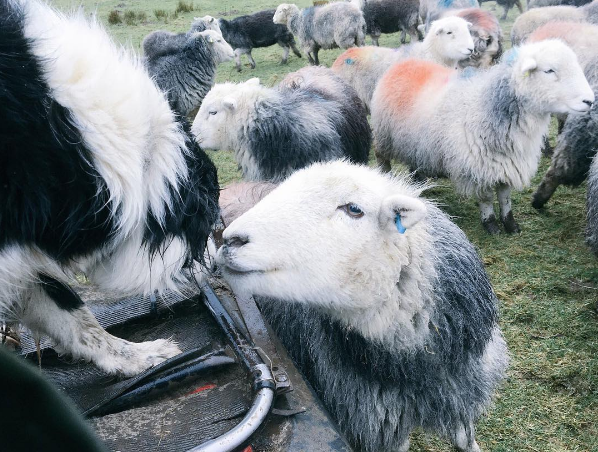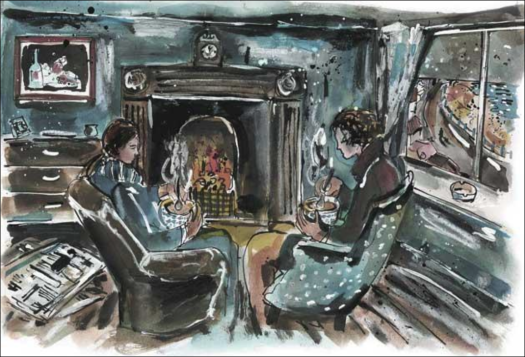 Literal sheep aren’t so bad… (credit to herdyshepherd1 on Instagram)
Literal sheep aren’t so bad… (credit to herdyshepherd1 on Instagram)
I’ve had an extremely difficult time writing my thoughts about Excellent Sheep. All the time I have sitting idle here, and you’d think it wouldn’t be a problem for me to write something. The trouble is that watching my puppy grow and my savings drain has given me far too much time for introspection. As the book unfolded, I kept coming to one unsettling realization after another. Digesting it left me with the taste of bile in my mouth as too many uncomfortable truths came burping up.
It’s been impossible to not to look at all the discoveries I’ve made in the study of talent and mastery without the sense of scathing irony that Deresiewicz uses in reference to his sheep. His conclusions are all things that I suspected, but hesitated to voice because they sound like a conspiracy theories. Looking back, I realize that it’s all there between the lines. In short, to become great requires practice, a few good coaches, grit, passion, and a supportive family. Practice is to hardwire the physical and mental skills into your brain. The series of great coaches show you shortcuts and provide feedback. Grit is the requisite quality to stick with your chosen field through the inevitable rough spots. Passion is the belief that what you’re doing matters and improves other’s lives. It’s important because self-discipline will only get you to a certain point (as I’ve learned in excruciating detail). And of course, you need a rich and well-connected family to buy you all this crap until your genius has fully blossomed and you can finally support yourself.
See what I mean about irony?
When I first wrote my reaction to the book, this was what I focused on for the first eight drafts, only it never rang true. The truth is that I’m not bitter about my family’s position. I’ve had a wonderful childhood and I deeply believe in the supremacy of learning over grade collecting, so my bitterness is from a different source. Really, it comes from a feeling of unfairness. It’s one thing to suspect that the deck is stacked against me and another matter entirely to read a book that lays bare the entire fetid system in all its perfumed smugness.
The first time I read the study done to explain why the majority of NHL hockey stars are born in the first ⅓ of the year I felt so vindicated. It was a perfect explanation for why I always felt overwhelmed by the size, strength, and speed of my opponents. When puberty was just the barest speck on the horizon for me, most of my opponents were already shaving and reeking of testosterone. When the age cutoff is Jan. 1, it’s obvious in retrospect that the kids born in Jan are just going to be bigger and stronger than those unfortunate enough to be born on say, Dec. 29, but the realization and unfairness of it continues to bug me. Reading this book has been a remarkably similar experience.
At the time, the age brackets discovery wasn’t something that made me want to give up. In fact, it motivated me even more. If I was behind now, then it was just a game of time. I’d work until all those lucky kids had given up or I’d caught up to them. I believed my work ethic and intelligence would shine through eventually.
I was obviously wrong as this book has made abundantly clear. To the people who matter, the gatekeepers, be they admissions staff, hiring executives, whatever; the criteria they base their decisions on are not the criteria by which I try to live my life and judge my personal success. Therefore, I will forever be the underdog trying to sneak in through the back door of every prestigious institution.
This forced me to a very unpleasant conclusion. Up until recently, I’ve been cracking against the glass ceiling in music for 7 years. What makes me think that things will be at all different when I apply to a prestigious business school? I was pretty sure a great GMAT score and some witty essays could get me in, but now that I realize what a great rejection candidate I am, I’m not so sure. I have no facets of my personality that would make me eligible to take a risk on in the name of diversity. I’m white, male, and of the middle class. I’m not an olympic athlete or a champion in anything that would add to the Ivy League mythos. I’m a failed musician who went to a state party school then to a graduate school overseas that nobody has ever heard of and majored in a liberal art, which everyone knows is worthless. I don’t speak an extra languages and my grades have far too many Bs to be noteworthy. Even if I got a perfect score on the GMAT, I wonder if I wouldn’t look like the ideal student to reject.
For the sake of argument, let’s say I get in despite my misgivings. What would I do? I would probably end up on two of the four paths that Deresiewicz says most sheep fall into by default: Finance or Consulting. Is this my passion in life? Even worse, what if after all that, I add another 100 grand to my student loan bill and nobody wants to hire me with such a spotty pedigree? I’ve already read one book where that was the case. A reporter at the top of his game went to Harvard Business School, graduated, and found himself jobless and analyzing the potential of buying into a chain of laundromats.
Am I a sheep who has delusions of grandeur? Even worse, am I an ass that pretends to be a sheep?
I have to reassess my priorities. Am I attracted to business school because I really want to learn things that they teach or do I just want to do it because the money, challenge, and prestige are appealing? When I first started studying for the GMAT, my ideas about what I wanted to study during my MBA were nebulous at best. They aren’t much better now.
It might be time for some soul-searching.
Advertisements Share this:




